Podcasts
Welcome to The Institute, a podcast where we profile the fascinating people connected to the Institute for the Arts and Humanities at The University of North Carolina at Chapel Hill. We talk with faculty about the pillars of their work in teaching, service and research. We learn the makings of successful leaders across disciplines. And we share this with you.
Subscribe on Apple Podcasts or Spotify.
Lien Truong, Assistant Professor of Art
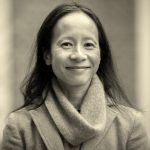
Faculty Fellow Lien Truong is a dedicated, renowned artist. She discusses how she was drawn to art as a teen. “It became an outlet for working out issues in the world.” She scoped out the faculty at Carolina before deciding to become a faculty member here. “One of the draws for me at the UNC’ art department, was I looked at the faculty and I really appreciated the work that they were making… work that really examines the political, social structure, and history within our experience.”
Gabriel Trop, Associate Professor, German Studies
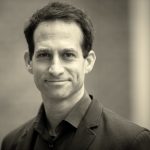
Gabriel Trop discusses how philosophy and literature led him to the scholarship of German aesthetics, especially the one professor who inspired and challenged him. He branched out to study the Classics to better understand German poets and philosophers, such as Hölderlin, Novalis, Brockes, Hagedorn, and Gleim. During his Faculty Fellowship he works on a project exploring attraction and indifference.
Tanya Shields, Associate Professor, Women’s and Gender Studies
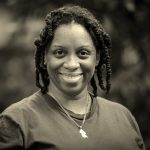
Tanya Shields is an Academic Leadership Program Fellow and director of undergraduate studies in her department. She discusses her latest work as dramaturge for the production of Plantation Remix at Houston-based Progress Theater. “The trauma and violence that people tour and enjoy, they want to disrupt that.” She is “helping build the context for the structure of the play as an advisor to the playwright. I am also learning how a play is created.”
Terry Rhodes, Professor and Senior Associate Dean for Fine Arts and Humanities
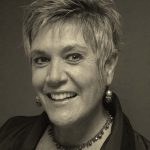
Terry Rhodes oversees all departments and programs in the divisions of fine arts and humanities, and assists in the recruitment, development, and retention of faculty in those divisions. Especially known for her work in contemporary music, she has served on the music faculty since 1987 as UNC Opera Director and a member of the voice faculty, and as departmental chair from 2009–2012. She discusses how music played an integral part in her growing up.
Leon Botstein, Bard College President, 2017 Reckford Lecturer
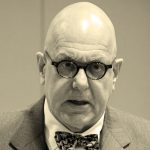
American Symphony Orchestra Conductor and Bard College President Leon Botstein delivered the 23rd annual Mary Stevens Reckford Lecture in European Studies entitled, “Sounding Forms: What Music and Its Practice Reveals Abotu Modern European History.”
Jane Brown and Pat Pukkila, Retired Faculty Program Co-Facilitators
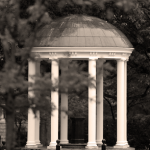
Jane Brown, is Professor Emerita in the School of Media and Journalism, former Chair of the Faculty, a Faculty Fellow and part of the inaugural Academic Leadership Program cohort and also Academic Leadership Program facilitator. Pat Pukkila is Professor Emerita in the Biology Department and founding director of the Office for Undergraduate Research. They discuss how the pilot Retired Faculty Program has taken off in providing this segment of Faculty with appreciation, purpose and community.
Kumarini Silva, Assistant Professor, Department of Communication
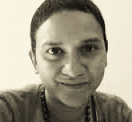
Kumarini Silva, whose research is at the intersections of feminism, identity and identification, post-colonial studies, and popular culture, discusses race and gender in current politics. She also talks about her latest book Brown Threat: Identification in the Security State (2016). Silva moderates the faculty event Difficult Conversations: Gender Equity in Higher Education.
Anna Hayes and Kim Church, Crooks Corner Book Prize
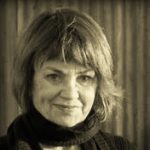
Anna Hayes, founder of the Crooks Corner Book Prize, discusses the local literature scene while author and 2015 Crooks Corner Prize winner Kim Church (pictured) reads from her book Byrd and talks about the writing process. Both were featured on the panel of the Emerging Writers Cafe at the Institute in December 2016.
Season 1 Highlights with Philip Hollingsworth and Melissa Clay
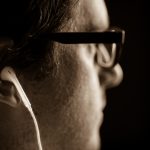
Coordinator for Faculty Programs Philip Hollingsworth and Communications Specialist Melissa Clay discuss their favorite episodes since the beginning of the IAH Podcast Series in November 2015 in this retrospective. “When I think about our podcast, I think about the interesting things we learn about the faculty here at UNC,” says Clay. Academia has these “pillars of teaching, research and service and how do they get all of that done?”
Jina Valentine, Assistant Professor of Art
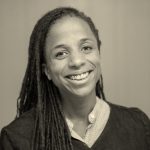
Jina Valentine is concerned with how art can inspire discussion. Black Lunch Table, a collaboration with fellow artists Hong-An Truong and Heather Hart, is a work of social-practice art that provides a discursive space for artists, activists, and community members to discuss critical issues. It began as a social experiment in 2005 with the question “what would happen if we segregated the lunch rooms. We are very interested in the conversations that happen at the lunch table,” said Valentine.
IAH Podcast | Jina Valentine, Assistant Professor of Art
 Jina Valentine is concerned with how art can inspire discussion. Valentine, UNC Assistant Professor of Art, discusses The Black Lunch Table, a collaboration with Heather Hart, a fellow artist based in New York.
Jina Valentine is concerned with how art can inspire discussion. Valentine, UNC Assistant Professor of Art, discusses The Black Lunch Table, a collaboration with Heather Hart, a fellow artist based in New York.
Black Lunch Table is a work of social-practice art that provides a discursive space for artists, activists, and community members to discuss critical issues. It began as a social experiment in 2005. It began with the question “what would happen if we segregated the lunch rooms. We are very interested in the conversations that happen at the lunch table,” said Valentine.
The Institute for the Arts and Humanities awarded its inaugural Arts and Social Justice Grant to hold a Black Lunch Table event in Spring 2017. Collaborating with Hong-An Truong February through April on the quad.
The BLT event is called All Rise. It combines strategies from two ongoing collaborative projects,The Black Lunch Table and Hong-An Truong’s And And And Stammering: An Interview (with artist Huong Ngo). All performances will be open to the public and sited outdoors on a temporary structure modeled after a courtroom, and at a set of movable picnic tables.
A lot of her work is very political, especially in the current political climate but also, she says ” in trying to understand my role as a mother of a black son,” says Valentine.
Valentine’s art practice uses art and paper and ink that she has made, working with found objects. “Working with text as found objects,” she says and I am also very interested in craft techniques.”
Jeannie Loeb, Senior Lecturer, Psychology and Neuroscience
During her Faculty Fellowship as a Chapman Family Teaching Award recipient, Jeannie Loeb worked on researching education strategies. She hopes to share her findings on best practices for organizing classes, communicating effectively, and keeping the class engaged. Loeb has a special interest in “students who are from populations which are struggling at universities: first-generation college students, transfer students and minority students.”
Christian Lentz, Assistant Professor, Geography
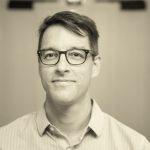
“The Faculty Fellowship has continued to immerse me in a scholarly community,” says Christian Lentz, who has been using his time away from teaching to concentrate on his book manuscript. He describes the project as “a story of territory as it is experienced and constructed in the Vietnamese revolution when they were fighting for independence from the French in the 1940s and ’50s.”
John McGowan, Director Emeritus 2006-2014
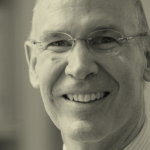
“I got involved in the IAH almost the day I arrived on campus, said John McGowan. “I got pulled into West House within two weeks. Ruel Tyson had gathered this intellectual community.” McGowan, the John W. and Anna H. Hanes Professor of English and Comparative Literature, and Director Emeritus of the Institute for the Arts and Humanities, is the 2016 recipient of the George H. Johnson Prize for Distinguished Achievement by an IAH Fellow.
Michele Berger, Director, Faculty Fellows Program
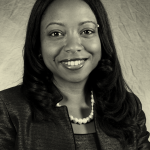
“Of course in the Faculty Fellows Program, people are highly productive. They are very excited about having a semester leave,” says Michele Berger. “I take a look at the mix of the Faculty Fellows that we have in terms of faculty rank because that makes a difference in terms of the kinds of projects they may be engaged in.” Berger is Director of the Faculty Fellowship Program. She is also Associate Professor in the Department of Women’s and Gender Studies.

